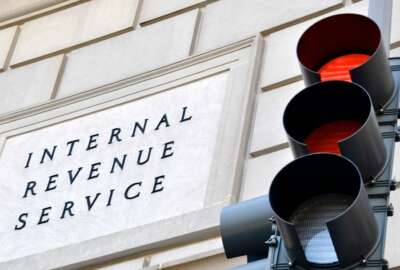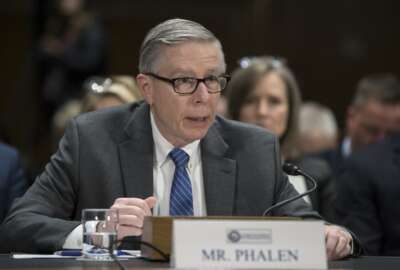
Equal Employment Opportunity Commission looks to become fully digital
In today's Federal Newscast, the Equal Employment Opportunity Commission said it now has the capability to make its charge processing and records system fully...
To listen to the Federal Newscast on your phone or mobile device, subscribe on PodcastOne or Apple Podcasts. The best listening experience on desktop can be found using Chrome, Firefox or Safari.
- The Equal Employment Opportunity Commission appears to be getting close to becoming fully digital. It proposed new regulations to allow parties to submit documents in its new online portal. EEOC said it now has the capability to make its charge processing and records system fully digital. Comments are due by April 23. (Federal Register)
- One step of applying for federal employment may get a little easier. The Office of Personnel Management and National Background Investigations Bureau are suggesting updates to the Declaration for Federal Employment Optional Form. It would be on one big form, including an explanation that the questions are not optional and must be answered. Comments also due by April 23. (Federal Register)
- Eight House committee leaders are asking for an extension of public hearings, comment periods and meetings that were impacted by the recent government shutdown. The House leaders wrote to Office of Management and Budget Director Mick Mulvaney asking for extensions of at least 35 days, the length of the recent government shutdown. The committee leaders said the request was inspired by the Environment Protection Agency’s decision to cancel some previously scheduled public hearings. (House Energy and Commerce Committee)
- Phase 1 of the federal reskilling prize competition from the National Science Foundation has closed. NSF launched the Career Compass Challenge back in November to solicit ideas for reskilling the federal workforce. The deadline for phase 1 was pushed back once to give college students more time to contribute their ideas, and again due to the recent government shutdown. NSF will look at prototypes during the second round of the competition, while no timeline for it has been announced. (Federal News Network)
- The public comment period for new, controversial access standards for veterans is now open. The Department of Veterans Affairs has new proposed standards for veterans to use non-VA medical care if, for example, they’ve been waiting 20-28 days or if the drive to see a VA provider takes at least 30 minutes for primary care and an hour for specialty care. The public comment period ends March 25. (Department of Veterans Affairs)
- U.S. Citizenship and Immigration Services is taking steps to implement the 21st-Century Integrated Digital Experience Act, a new law aimed a make dot-gov websites more mobile-friendly and secure. Over the last six to eight months, the agency’s digital services division has consolidated some of its teams focused on public-facing digital services. Courtney Winship, the chief of USCIS’s digital services division, said the agency has also looked at use cases for artificial intelligence and machine learning. (Federal News Network)
- NASA isn’t getting a clean break from its troubled ACES contract like it had hoped. Incumbent vendor Perspecta, formerly HP Enterprise Services, filed a protest with the Government Accountability Office after NASA awarded the follow-on contract to Leidos earlier this month. NASA is replacing the 10-year, $2.5 billion agency consolidated end-user services or ACES contract with a new one called NEST, NASA End-user Services and Technologies. Perspecta filed the complaint on Feb. 19 and GAO has until May 30 to decide the matter. (Federal News Network)
- Despite recommendations from Defense Department’s testing office, it’s full steam ahead for the Pentagon’s Joint Regional Security Stacks. Just a few weeks ago, the director of Operational Test and Evaluation urged DoD to put the program on hold because JRSS is still not operationally effective. It’s the second year in a row it’s reached that conclusion. The Defense Information Systems Agency said it’s not changing its deployment plans, but acknowledges the system needs improvements. It said it’s implementing fixes in five separate areas to address concerns the military services have expressed. (Federal News Network)
- A new Defense Department survey confirms active duty military spouse unemployment was at 24 percent in 2017 and has hovered in that range for at least five years. The number has been previously reported by other organizations, but not from DoD since 2015. The DoD survey also noted that military spouse stress is continuing to rise. Military family organizations say the findings show that the Defense Department needs to rethink how it approaches military spouse unemployment.
- AirShare Complete, Bitwoke, and Smile ML — the Air Force announced the 10 companies participating in its in-residence technology accelerator. The companies specialize in everything from drones to artificial intelligence to recognizing emotions. The accelerator helps the Air Force partner with small businesses to solve technological challenges. Companies will receive education on entrepreneurship, business and marketing throughout the three month program. (Air Force)
- The Defense Intelligence Agency is hosting an unclassified reverse industry day, the first of its kind for the intelligence community. On April 3 in Washington, D.C., DIA acquisition employees will listen to two panels of small, medium and large businesses on how they invest based on federal requirements, and how vendors decide what RFPs to bid on. Registration closes on March 15. (FedBizOpps)
- It’s too early tell what will happen to her, but a defense senior executive seems to be in a lot of trouble. The DoD inspector general confirmed whistleblower allegations against Ellen Ardrey, Defense Intelligence Senior Executive. As director of the human development directorate at the National Geospatial Intelligence Agency, Ardrey circumvented policy by allowing seven NGA senior officials to hop down to non-senior positions so they could collect $40,000 voluntary leave payments. This happened while the agency had no budget shortfalls or downsizing plans. (Department of Defense Office of Inspector General)
Copyright © 2025 Federal News Network. All rights reserved. This website is not intended for users located within the European Economic Area.
Eric White
Eric White is news anchor and Federal Drive producer at Federal News Network.
Follow @FEDERALNEWSCAST
Related Stories
Getty Images/iStockphoto/marcnorman

IRS catches up with advisory council, following ‘stalled’ agenda under shutdown

Despite skepticism, DoD, NBIB insist pending security clearance transfer will be seamless
Related Topics
Agency Oversight
Air Force
All News
Citizenship and Immigration Services
Congress
Contracting
Defense
Defense Industry
Defense News
Digital Government
Digital services
DISA
EEOC
Equal Employment Opportunity Commission
Federal Drive
Federal Newscast
Government Shutdown
IT Modernization
Joint Regional Security Stacks
Management
military spouses
NASA
National Background Investigations Bureau
National Geospatial-Intelligence Agency
National Science Foundation
Office of Management and Budget
Office of Personnel Management
Online Portal
public comment period
Technology
Veterans Affairs
whistleblower
Workforce



